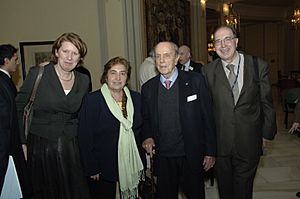Manuel Fraga facts for kids
Quick facts for kids
The Most Excellent
Manuel Fraga Iribarne
|
|
|---|---|
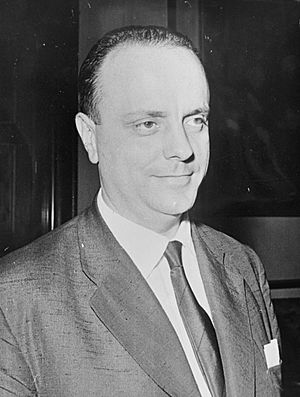 |
|
| 4th President of the Regional Government of Galicia | |
| In office 5 February 1990 – 2 August 2005 |
|
| Monarch | Juan Carlos I |
| Preceded by | Fernando González Laxe |
| Succeeded by | Emilio Pérez Touriño |
| Minister of the Interior | |
| In office 15 December 1975 – 5 July 1976 |
|
| Monarch | Juan Carlos I |
| Preceded by | Jose Garcia Hernandez |
| Succeeded by | Rodolfo Martín Villa |
| Minister of Information and Tourism | |
| In office 10 July 1962 – 29 October 1969 |
|
| Leader | Francisco Franco |
| Preceded by | Gabriel Arias-Salgado |
| Succeeded by | Alfredo Sánchez Bella |
| Member of the Congress of Deputies | |
| In office 15 June 1977 – 3 July 1987 |
|
| Constituency | Madrid |
| Member of the Senate | |
| In office 7 February 2006 – 27 September 2011 |
|
| Member of the Parliament of Galicia | |
| In office 17 December 1989 – 7 February 2006 |
|
| Constituency | Lugo |
| Personal details | |
| Born | 23 November 1922 Vilalba, Galicia, Spain |
| Died | 15 January 2012 (aged 89) Madrid, Spain |
| Political party | People's Party (1989–2012) People's Alliance (1977–1989) FET y de las JONS (1962–1977) |
| Other political affiliations |
People's Alliance Democratic Reform |
| Spouse |
Carmen Estévez Eguiagaray
(m. 1948; d. 1996) |
| Children | 5, including Carmen |
| Residences | Madrid, Spain |
| Alma mater | University of Santiago de Compostela |
| Signature |  |
Manuel Fraga Iribarne (23 November 1922 – 15 January 2012) was an important Spanish politician and professor. He was also the founder of the People's Party.
Fraga held many key roles in Spanish politics. He was the Minister of Information and Tourism from 1962 to 1969. Later, he served as Ambassador to the United Kingdom. He also became the Minister of the Interior in 1975. From 1990 to 2005, he was the President of the Regional Government of Galicia. Fraga was also a Member of Parliament and a Senator. He played a big part in Spain's move from a dictatorship to a democracy. He is known as one of the "Fathers of the Constitution" because he helped write Spain's democratic constitution.
| Top - 0-9 A B C D E F G H I J K L M N O P Q R S T U V W X Y Z |
Manuel Fraga's Life Story
Early Years
Manuel Fraga was born in Vilalba, a town in Galicia, Spain. He studied law, economics, and political science. His political career began in 1945, during the time of General Francisco Franco's rule.
In 1948, Fraga married Carmen Estévez Eguiagaray. They had five children: Carmen, Isabel, José Manuel, Ignacio, and Adriana. He also adopted Amalia. Manuel Fraga was very good at languages. Besides Spanish, he could speak French, English, Italian, German, Portuguese, Galician, and Basque.
Minister of Information and Tourism
In 1962, Fraga became the Minister of Information and Tourism. He worked hard to make Spain a popular place for tourists. He launched a famous campaign with the slogan Spain is different!.
In 1966, there was a nuclear accident in Palomares. To show people it was safe, Fraga swam in the sea with the American ambassador. This helped calm fears about the water. Later, he made censorship laws less strict. This meant that what people wrote or published was checked after it was printed, not before.
Ambassador to the United Kingdom
From 1973 to 1975, Manuel Fraga served as Spain's Ambassador to the United Kingdom. He wanted to finish writing a book during this time. He also made sure he had some freedom in his role.
Minister During Spain's Transition
After General Franco died in 1975, Spain began its move towards democracy. Manuel Fraga was appointed as a deputy prime minister and Interior Minister in December 1975. He held this position until July 1976. This was the first government under King Juan Carlos I.
Fraga believed that Spain needed to become a democracy. However, he thought this change should happen slowly and carefully.
Leading the People's Alliance
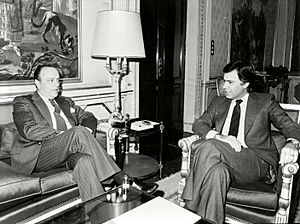
In 1976, Fraga and other politicians formed a new group called the People's Alliance (AP). This group later became a full political party. Fraga wanted it to be a mainstream conservative party.
He was one of the people who helped write Spain's new democratic constitution in 1978. This constitution is very important for Spain's democracy.
The People's Alliance became the second-largest party in the Spanish Parliament in 1982. Fraga became the Leader of the Opposition to the ruling party. In 1983, there was some controversy when it was reported that a former Argentine police officer, who had been linked to a far-right group in Argentina, had joined his personal security team.
Creating the People's Party
In 1986, Fraga stepped down from leading the People's Alliance. He then became a Member of the European Parliament until 1989.
In 1989, Fraga briefly returned to lead the party. He helped create the new People's Party (PP). This new party brought together several smaller parties. Fraga then encouraged José María Aznar to become the new leader of the PP. Fraga was made the honorary president of the party.
President of Galicia
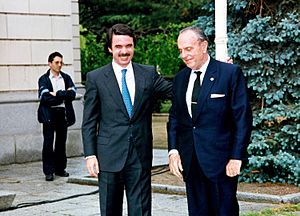
In 1989, Manuel Fraga returned to his home region of Galicia. He became the President of the Xunta of Galicia, which is like the regional president. He held this job for nearly 15 years, until 2005.
In 1996, his wife, Carmen, passed away.
In 2002, a large oil tanker called the Prestige sank off the coast of Galicia. This caused a huge oil spill. Many people felt that Fraga was slow to react to this disaster. This damaged his public image.
In the 2005 regional elections, Fraga's party lost its majority in the Galician Parliament. A new government was formed by other parties. Fraga continued to be involved in politics as a member of the Senate, representing Galicia.
Later Life
Manuel Fraga served in the Spanish Senate from 2006 until 2011.
He passed away on 15 January 2012, at the age of 89, due to a breathing illness. His funeral was attended by important figures, including Prince Felipe and Princess Letizia.
Manuel Fraga's Legacy
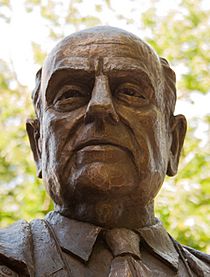
Manuel Fraga Iribarne was a very important and sometimes controversial politician in modern Spain. He helped write the democratic constitution and worked to make censorship less strict. However, he also openly admired General Franco.
His supporters saw him as a hero for Galicia. They believed he modernized the region and boosted tourism. He helped build many roads and motorways. In 2000, he approved a plan to build Spain's first high-speed train in Galicia.
His opponents often saw him as a reminder of the Franco regime. Despite their political differences, he became good friends with Fidel Castro, the leader of Cuba, who had Galician roots. Castro even visited Fraga in Galicia in 1992.
See also
 In Spanish: Manuel Fraga para niños
In Spanish: Manuel Fraga para niños
 | Selma Burke |
 | Pauline Powell Burns |
 | Frederick J. Brown |
 | Robert Blackburn |


